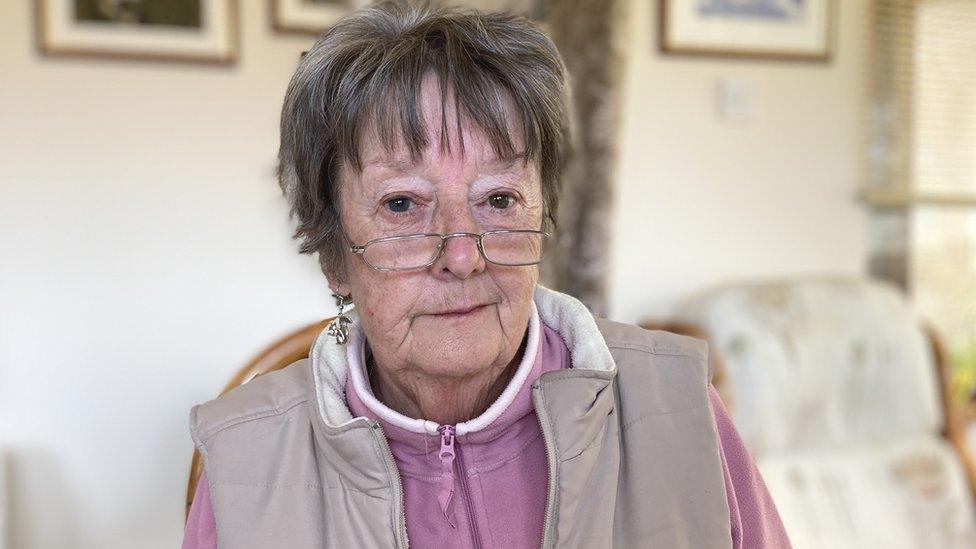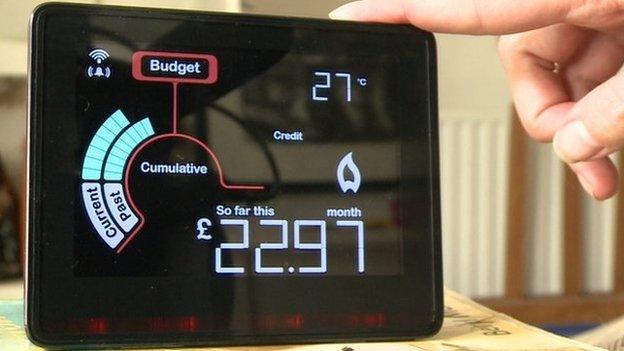Energy firms urged to return credit to customers
- Published

SNP MP Drew Hendry has been campaigning for energy firms to return customers' credit balances
Energy firms are keeping thousands of pounds of their customers' money in bill credits "without their permission", according to an SNP MP.
Drew Hendry said many of his constituents' bills were increasing when they had credit on their accounts.
One woman discovered she was more than £2,000 in credit earlier this year.
Mr Hendry is calling on Ofgem to ensure firms return the money to their customers.
He also urged all energy companies to change their processes to allow customers to easily withdraw "excessive" credit balances.
Mr Hendry said: "Some of those credit balances that people hold, that they might not even be aware about, they could be hundreds, in some cases thousands of pounds.
"It's not behaviour that we can allow to continue.
"We should be working in the consumer interest. While people are working with high bills they should have as much of their own money back in their banks - so they can use it for their own purposes - as they can possibly get."
As energy prices have climbed over the last year, Fran Raw from Newtonmore in the Highlands began to check her energy balance more diligently.
In February she received a statement which showed her balance was more than £2,000 in credit.
After she was given an up to date bill, the balance was about £900.
She said Ovo Energy continued to charge her about £200 per month.

Fran Raw's credit balance was more than £2,000 in February
"I feel like I'm a puppet and they're pulling my strings," she said. "I'm losing my say in my business and that's not on."
Mrs Raw uses electrical storage heaters, but switched two out of four off to cut her energy usage while she attempted to claim her money back.
She is spending a third of her state pension on energy bills while her occupational pension "just about" keeps her car on the road.
She added: "They need taken to task - what are they doing with all this money that they've got sitting in their bank?
"They make a profit of billions, I can't imagine what billions look like."
A spokesperson for Ovo Energy said the company had taken a meter reading this week and Mrs Raw's balance was £496.59.
They added: "Mrs Raw has requested that the credit balance remains on the account to cover future usage."
'Look after consumers'
Frazer Scott, chief executive officer at Energy Action Scotland, said the majority of people pay their energy bills by direct debit to keep their payments stable.
He said it was not surprising for people to have "substantial" credit balances because of changes to energy prices, but it was unacceptable for firms to keep money that households "desperately need".
"It should not be a difficult process for people to recover excessive balances," he said. "Energy is a multi-billion pound provision but a balance does need to be struck.
"Companies cannot be living on the credit provided by their customers to an excessive amount.
"Many, many households have seen excessively high balances being held and they've found it more and more difficult to get their payments back because suppliers are able to simply justify it based on projections they have of the consumption you may, or may not have over the coming 12 months."
According to Ofgem, customers can ask their supplier to refund their credit at any time.
It said suppliers "must do so promptly unless they have reasonable grounds not to".
Beyond that, customers can raise a complaint with their supplier before they can take the issue to the Energy Ombudsman, who would investigate the outcome of the complaint.
Mr Hendry opened a Westminster debate, external on the issue in February, during which he said that firms had held an estimated £9bn of customer cash by November last year, according to a Guardian report.
Speaking to BBC Scotland, he said companies have been sitting on credits without returning them "unless absolutely pushed" to do so.
"We need the regulator Ofgem to start doing the job it's supposed to do and look after consumers," he said.
"We need the UK government to tell Ofgem to regulate on this matter, to make sure this money is returned where it belongs - in people's pockets."

The UK government introduced a limit to the sum households could be charged for each unit of energy they use. This came when energy prices soared following Russia's invasion of Ukraine.
The cap, called the energy price guarantee, means bills for a typical household for gas and electricity are about £2,500 per year.
It will stay in place at the same level until the end of June, though the £400 discount on bills which most households received this winter has come to an end.
In recent months global energy prices have been falling, and experts predict cheaper prices for households later this year.
Analysts at Cornwall Insight think Ofgem's energy price cap will fall to £2,153 in July, and remain close to that level for the rest of the year.
That would make the government's energy price guarantee redundant by July.
Cornwall Insight says at this point households might once again be able to shop around for more competitive energy deals.
Related topics
- Published12 January 2023

